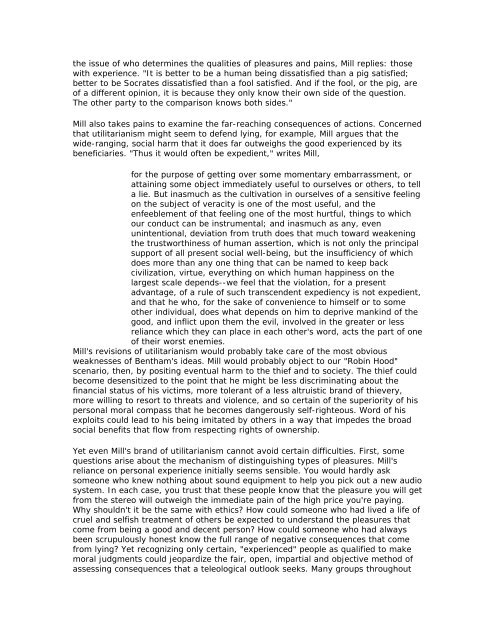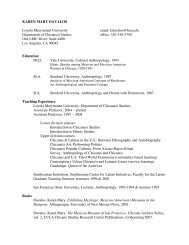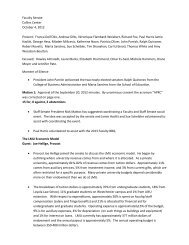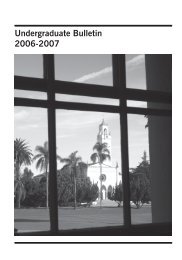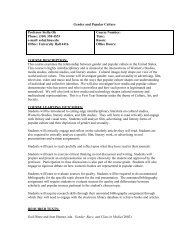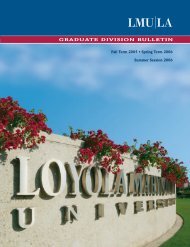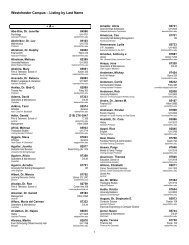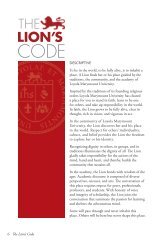PHILOSOPHICAL ETHICS Adapted from Thomas White, "Ethics ...
PHILOSOPHICAL ETHICS Adapted from Thomas White, "Ethics ...
PHILOSOPHICAL ETHICS Adapted from Thomas White, "Ethics ...
You also want an ePaper? Increase the reach of your titles
YUMPU automatically turns print PDFs into web optimized ePapers that Google loves.
the issue of who determines the qualities of pleasures and pains, Mill replies: those<br />
with experience. "It is better to be a human being dissatisfied than a pig satisfied;<br />
better to be Socrates dissatisfied than a fool satisfied. And if the fool, or the pig, are<br />
of a different opinion, it is because they only know their own side of the question.<br />
The other party to the comparison knows both sides."<br />
Mill also takes pains to examine the far-reaching consequences of actions. Concerned<br />
that utilitarianism might seem to defend lying, for example, Mill argues that the<br />
wide-ranging, social harm that it does far outweighs the good experienced by its<br />
beneficiaries. "Thus it would often be expedient," writes Mill,<br />
for the purpose of getting over some momentary embarrassment, or<br />
attaining some object immediately useful to ourselves or others, to tell<br />
a lie. But inasmuch as the cultivation in ourselves of a sensitive feeling<br />
on the subject of veracity is one of the most useful, and the<br />
enfeeblement of that feeling one of the most hurtful, things to which<br />
our conduct can be instrumental; and inasmuch as any, even<br />
unintentional, deviation <strong>from</strong> truth does that much toward weakening<br />
the trustworthiness of human assertion, which is not only the principal<br />
support of all present social well-being, but the insufficiency of which<br />
does more than any one thing that can be named to keep back<br />
civilization, virtue, everything on which human happiness on the<br />
largest scale depends--we feel that the violation, for a present<br />
advantage, of a rule of such transcendent expediency is not expedient,<br />
and that he who, for the sake of convenience to himself or to some<br />
other individual, does what depends on him to deprive mankind of the<br />
good, and inflict upon them the evil, involved in the greater or less<br />
reliance which they can place in each other's word, acts the part of one<br />
of their worst enemies.<br />
Mill's revisions of utilitarianism would probably take care of the most obvious<br />
weaknesses of Bentham's ideas. Mill would probably object to our "Robin Hood"<br />
scenario, then, by positing eventual harm to the thief and to society. The thief could<br />
become desensitized to the point that he might be less discriminating about the<br />
financial status of his victims, more tolerant of a less altruistic brand of thievery,<br />
more willing to resort to threats and violence, and so certain of the superiority of his<br />
personal moral compass that he becomes dangerously self-righteous. Word of his<br />
exploits could lead to his being imitated by others in a way that impedes the broad<br />
social benefits that flow <strong>from</strong> respecting rights of ownership.<br />
Yet even Mill's brand of utilitarianism cannot avoid certain difficulties. First, some<br />
questions arise about the mechanism of distinguishing types of pleasures. Mill's<br />
reliance on personal experience initially seems sensible. You would hardly ask<br />
someone who knew nothing about sound equipment to help you pick out a new audio<br />
system. In each case, you trust that these people know that the pleasure you will get<br />
<strong>from</strong> the stereo will outweigh the immediate pain of the high price you're paying.<br />
Why shouldn't it be the same with ethics? How could someone who had lived a life of<br />
cruel and selfish treatment of others be expected to understand the pleasures that<br />
come <strong>from</strong> being a good and decent person? How could someone who had always<br />
been scrupulously honest know the full range of negative consequences that come<br />
<strong>from</strong> lying? Yet recognizing only certain, "experienced" people as qualified to make<br />
moral judgments could jeopardize the fair, open, impartial and objective method of<br />
assessing consequences that a teleological outlook seeks. Many groups throughout


